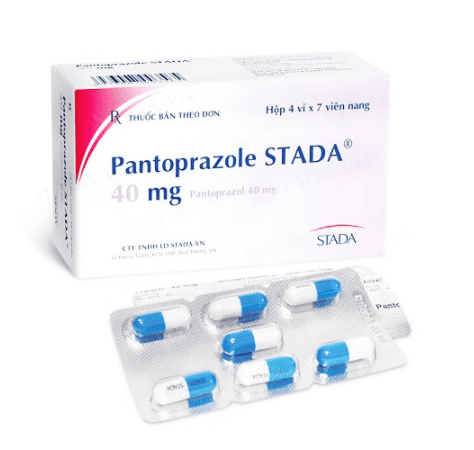This is an automatically translated article.
Metopar drug is made in the form of hard capsules, with the main ingredient Lansoprazole. The drug is used in the treatment of certain diseases of the stomach.
1. What is Metopar 30?
Each Metopar 30 tablet contains the active ingredient Lansoprazole 30mg and excipients just enough. Lansoprazole is a benzimidazole derivative with anti-secretory effect on gastric acid. Lansoprazole is structurally and pharmacologically related to omeprazole. Lansoprazole irreversibly binds to the enzyme H + / H + ATPase (regarded as the acid (proton) pump of the gastric parietal cells), so Lansoprazole is considered a proton pump inhibitor. Lansoprazole inhibits gastric acid secretion in the late stage, the level of gastric acid secretion is related to the duration of treatment and the dose of the drug.
Lansoprazole increases the concentration of gastrin in the blood plasma; Plasma gastrin concentrations reach high levels within 2 months of treatment and return to pre-treatment levels within 1 to 12 weeks after drug discontinuation. Lansoprazole also reduces pepsin secretion and increases serum pepsinogen. Lansoprazole can be used in combination in the treatment of Helicobacter in patients with duodenal infection or gastric ulcer.
Metopar is used in the following cases:
Treatment of acute gastric and duodenal ulcers (due to H.pylori infection/non-infection); Treatment of gastroesophageal reflux disease (GERD); Prophylaxis of peptic ulcers caused by non-steroidal anti-inflammatory drugs; Treatment of multiple endocrine neoplasia, Zollinger - Ellison syndrome. Do not use Metopar for people with hypersensitivity to any of the ingredients in the drug and pregnant women in the first 3 months.
2. How to use and dose Metopar
Metopar is to be taken orally before meals, do not chew or break the tablet.
Dosage:
People with duodenal ulcer: Take 1 tablet / day x 4 weeks, take the drug in the morning before meals; People with stomach ulcers: Take 1 tablet / day x 8 weeks; People with gastroesophageal reflux disease: Take 1 tablet / day x 4 weeks, can take another 4 weeks if not cured; Therapy for eradication or Helicobacter pylori in gastric and duodenal ulcers: Triple therapy: Lansoprazole + Clarithromycin + Amoxicillin: The recommended dose for adults is: 30mg Lansoprazole + 500mg Clarithromycin + 1g Amoxicillin x 2 times/day (every 12 hours) for 10-14 days and taken before meals; People with Zollinger - Ellison syndrome: The starting dose for adults is 60mg/day, adjusting the dose based on the patient's response to the drug. Oral doses can range from 15 to 180 mg/day. Doses above 120mg/day should be divided into 2 oral doses; Prophylaxis in case of peptic ulcer caused by non-steroidal anti-inflammatory drugs: Oral 30mg/day; Patients with hepatic or renal impairment: No dose adjustment is required in patients with mild to moderate renal or hepatic impairment. Overdose:
Symptoms: Convulsions, sedation, hypothermia, decreased respiratory rate; Treatment of overdose: In case of overdose of Metopar, the patient's health should be closely monitored. Hemodialysis does not eliminate Lansoprazole. If necessary, perform gastric lavage, use activated charcoal, and treat symptomatically.
3. Side effects of Metopar
During the use of Metopar, patients may experience some unwanted effects:
Common: Constipation, diarrhea, vomiting, nausea, rash, abdominal pain dizziness, headache; Uncommon: Increased serum gastrin concentration, fatigue, increased liver enzymes, increased hemoglobin, increased hematocrit, increased uric acid and proteinuria. Patients need to inform the doctor about the unwanted effects encountered when taking Metopar for advice on the most appropriate response.
4. Be careful when using Metopar
Some things to keep in mind when using Metopar are:
In case of gastric ulcer, the possibility of gastric malignancy should be excluded because treatment with Lansoprazole may delay the diagnosis due to reduce the symptoms of the disease; Metopar should be used with caution in patients with liver damage. No dose adjustment is required for renal impairment, including patients undergoing dialysis; There is no need to adjust the dose of Metopar in the elderly; Children: The safety of Lansoprazole has not been established at this time; Pregnancy and breast-feeding: Metopar is not recommended for pregnant women. Discontinue breast-feeding if Lansoprazole is considered essential; The effect of Metopar on the ability to drive and use machines has not been reported.
5. Metopar drug interactions
Some Metopar drug interactions are:
Lansoprazole may increase the concentration of drugs metabolised by CYP3A4. Caution should be exercised when combining Lansoprazole with drugs metabolized by this enzyme; The absorption of itraconazole and ketoconazole from the gastrointestinal tract is increased by the presence of gastric acids. Lansoprazole may reduce the effect of itraconazole and other drugs that require an acidic environment; Sucralfate/acid-neutralizing drugs can slow and reduce lansoprazole absorption by about 30%. Therefore, Lansoprazole should be taken at least 1 hour after taking these drugs. Theophylline clearance is increased with concomitant use of lansoprazole. During the use of Metopar, patients should pay attention to listen to and follow the instructions of the doctor, carefully read the drug use notes to achieve high efficiency.
Please dial HOTLINE for more information or register for an appointment HERE. Download MyVinmec app to make appointments faster and to manage your bookings easily.













